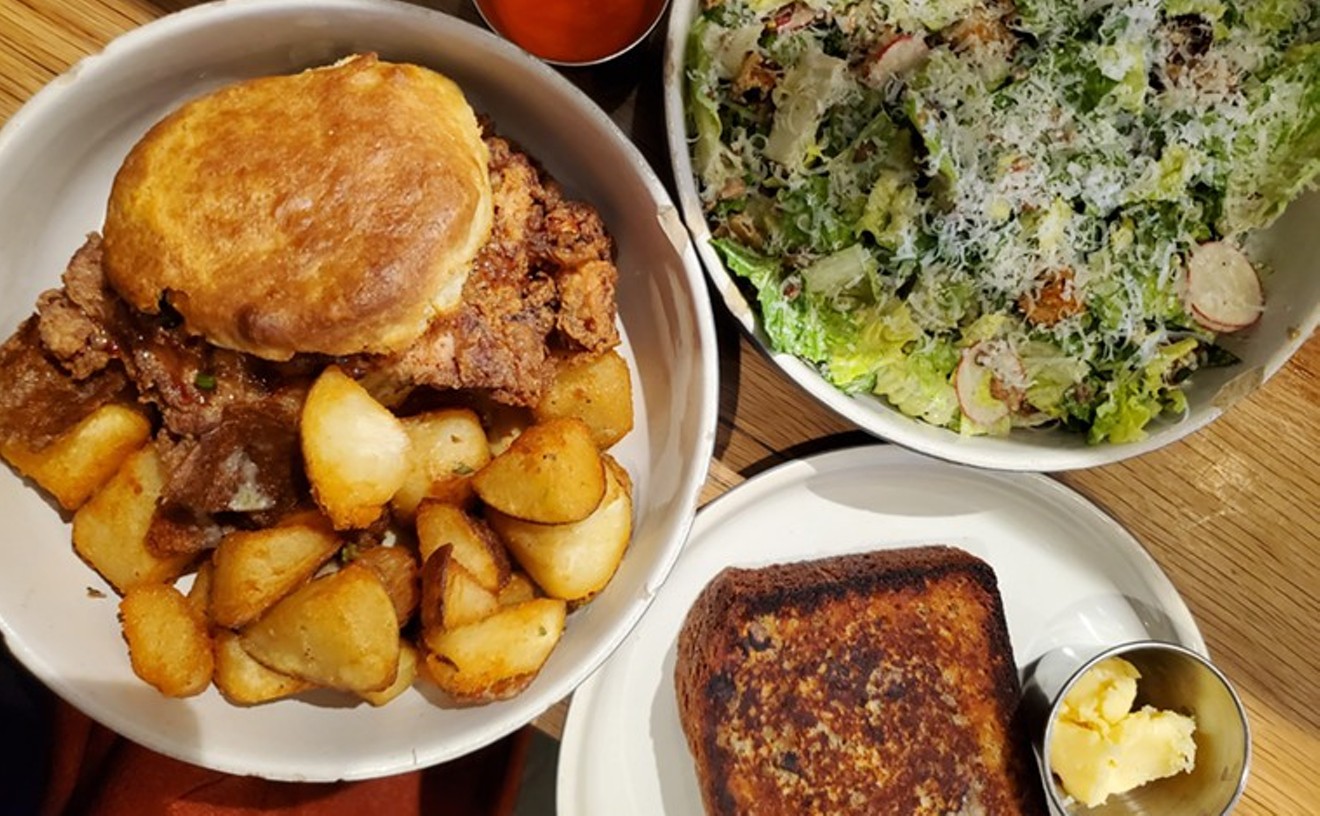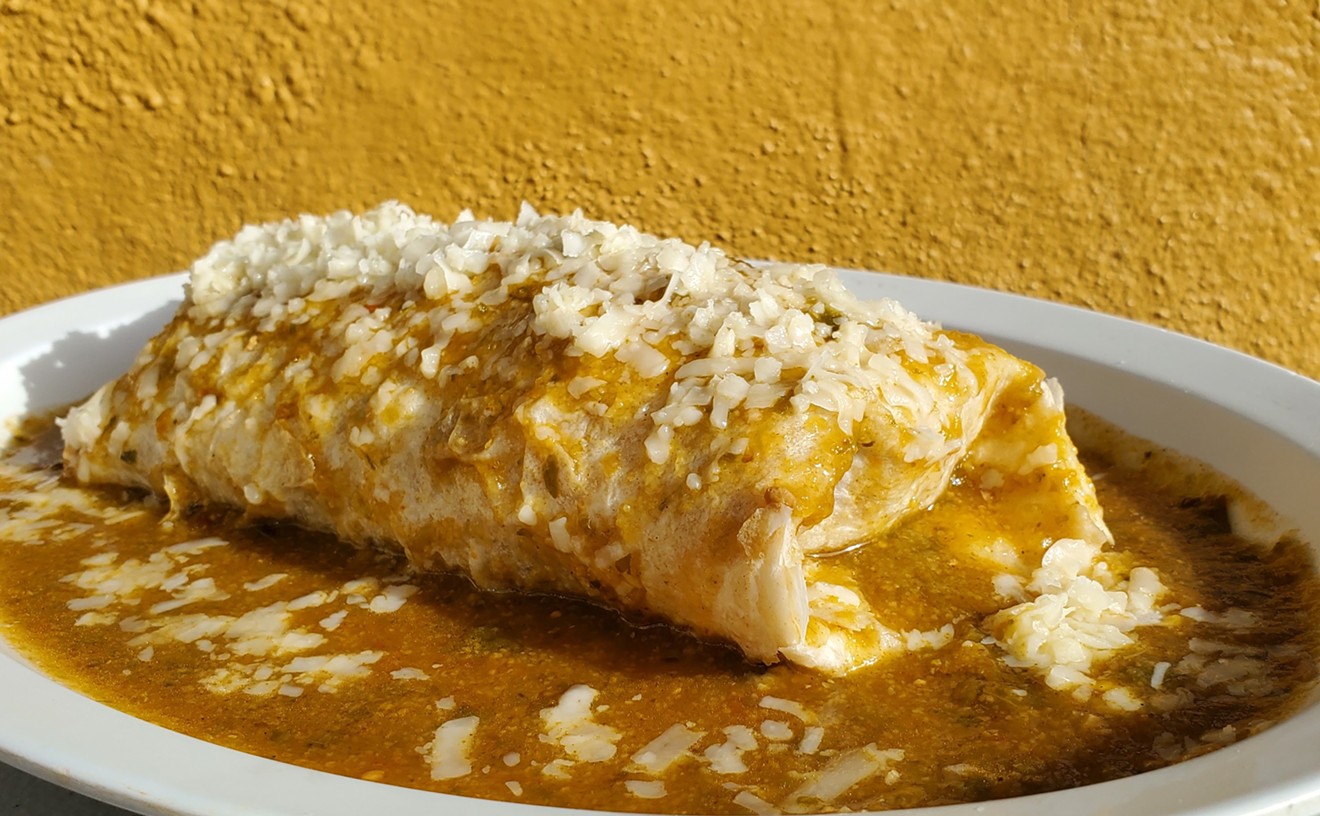In advance of the roll-out, we got a chance to try the new protein (spoiler alert: it's meat-free, but so freaking delicious that just about everybody will like it) and chat with Chipotle chef Nate Appleman about developing the tofu-based ingredient.
See also: Chipotle founder Steve Ells discusses the ingredients behind two decades in business
First things first: What is sofritas? Shredded Hodo Soy tofu (non-GMO) braised with chipotle chiles, roasted poblano peppers and assorted spices. The texture is incredibly meaty, and the flavor is smoky and rich; in fact, Appleman says, of all the proteins available on the Chipotle menu, the sofritas and the pork barbacoa are the most flavorful.
We tried sofritas with chips, rice and rolled up in a burrito, and it was everything we've grown to expect from Chipotle: flavorful fresh food made to order. Try it on its own, and you can really taste the smoky adobo and enjoy the texture of the shredded tofu. In areas on the West Coast where sofritas has already been tested, it's typically used as a meat replacement in burritos, burrito bowls or salads -- but often it's added to an order that already contains meat.
The genesis of this meatless ingredient started with a search for a new way to use...meat. "It wasn't like, 'Hey, let's start a project, and our initiative for this project is going to be a meatless alternative for the line," Appleman explains. "It all came from chorizo."
Which, he readily admits, "sounds crazy." But that's how it started.
"I was working on a chorizo for Chipotle because I believe in finding more ways to use the entire animal -- I think if we're going to be sustainable and walk that walk, we have to find more ways to use more of the animal," he says. "That was the path I was going down. So by making chorizo, we were making chicken and pork and different cuts than we normally use.
"We haven't had a new protein in nineteen, twenty years," Appleman continues. "Everything on the Chipotle menu was on the original lineup: barbacoa, carnitas, chicken, steak. And the powers-that-be said we're not sure if chorizo is the one we want to bust out of the gates with. So we thought, maybe we can come up with a different way to go about this instead of using more meat. Maybe this could turn into something that's not meat."
At the same time, Appleman was also developing the menu for Chipotle's sister restaurant, ShopHouse Southeast Asian Kitchen. And those same powers-that-be were already sold on the Hodo Soy tofu used in ShopHouse dishes. "We loved this product so much," he says. "So I took it one day and I chopped it all up like it was meat and we were all eating it thinking how great it was, and we all looked at each other and thought maybe something like this could work for chorizo. So we took the same tofu, seasoned it and cooked it just like you would chorizo. It turned out really great. We all loved it. And we actually ended up serving it at the original Cultivate, and a couple of different marketing events like that, because we liked it so much."
He noticed, though, that it didn't hold up on the line as well as he'd hoped -- it was a dry ingredient and the quality tended to deteriorate as it sat.
"Simultaneously I was working on other marketing foods and was working on this barbacoa chili," Appleman continues. "We took some of our barbacoa, our black beans and pinto beans and mixed it with this sauce I make called 'sofritas.' It was like, let's take what we already have and mix it with this really good sauce: tomatoes, adobo, peppers, onions, poblano, everything we have in the restaurant. And it turned out to be this amazing chili. So I thought, well, we developed this sofritas sauce, we might as well use it for something. So back to the ground tofu, I took the tofu and the sauce and mixed it together and we ended up having like a tofu chili, if you will."
The mix was dubbed sofritas, and has been tested in California, Oregon and Washington. "The cool thing is, the crew members at our restaurants are the ones who sell this," Appleman says. "If they don't believe in it, it's not going to sell. We started in five restaurants in San Francisco and fairly quickly it went to all 300 restaurants in California, then Oregon, Washington, and now it's coming to Denver. We have buy-in from the crew, they believe in it -- which is a hard sell, because even as an employee of Chipotle, I get the same thing every time I go. Everybody does that! So to get somebody like me to switch up and try something and believe in it is huge. It's not like we forced it to happen, it just happened."
And the crew members have made believers of the diners. "I know it's definitely taking away sales from meat, and the meat-eaters are switching to try something new," Appleman notes. "People are digging it."
But Chipotle definitely kept non-meat eaters in mind. Sofritas is prepared on a surface that's separate from any used to prepare meat, and the formula was fine-tuned to make sure it would work for plant-based eaters. "The original recipe for the barbacoa chili had honey in it, but we ended up taking the honey out because we wanted it to be vegan," he says. "We're very conscious of that -- we understand that as a vegan, as a vegetarian, you don't want your food coming into contact with meat. We get it. We talk about that in training all the time and make sure everybody understands. Perception is everything, and we just make everybody aware that it's something we care about and it's something the customers care about."
The addition of sofritas has led him to mix up his order more often, and that's a big deal to any Chipotle regular. "When I'm in an area that has sofritas, my order has changed," Appleman says. "I change up my burrito to include it. It won me over -- and that takes a lot because I ate more tofu over the last two years of working on ShopHouse than any person should eat tofu."
Find sofritas today at a Chipotle near you -- and with 74 in this state, there's certain to be a store close by, including the location at 1644 East Evans where it all started. Visit chipotle.com for more information.
Follow @CafeWestword












